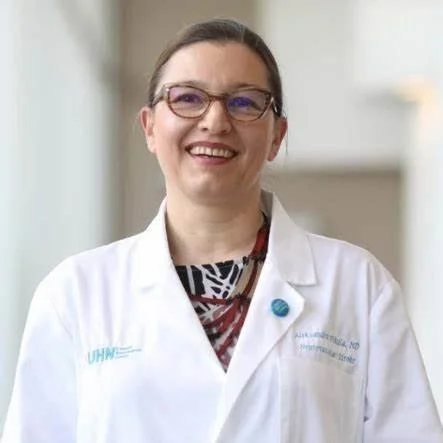Speaker: Dr. Aleksandra Pikula
Dr. Aleksandra Pikula is an Associate Professor of Medicine (Neurology) at the University of Toronto, a Clinician-Investigator at Krembil Brain Institute, Director of Stroke Neurology Research at UHN and Co-Director of Women's Neurology Fellowship at U of T. She is a founder and director of the largest multidisciplinary Stroke in Young Adults (SiYA) Program in Canada that entails three clinics - Combined CNS Vasculitis, Stroke in Young and Stroke in Women. Dr. Pikula completed her clinical training in Internal Medicine at NYU (MSH), Neurology at Boston University School of Medicine, and a three-year combined clinical and research Vascular Neurology fellowship at the Boston University School of Medicine (BMC), at the Harvard School of Medicine (MGH) and at the Framingham Heart Study where she worked for 5yrs prior to joining UHN.
Dr. Pikula’ s overarching clinical and research interests are focused on clinical and subclinical cerebrovascular disease in young population, with special interest in sex-disparities and women’s health. Over the past decade, a major focus of her research had been in identifying the biological/molecular pathways and imaging markers for overt/covert vascular brain disease in middle-aged population (Framingham). At UHN/KBI, Dr. Pikula’ s clinical research is focused on sex-disparities in stroke outcomes by utilizing PROMS and studying the effect of various factors (psychological, social, lifestyle) on HRQOL, stroke outcomes and post-stroke needs in young stroke survivors. This led to an emerging interest in developing innovative clinical strategies for primary/secondary stroke prevention in young.
Dr. Pikula’ s work had been published in high impact journals and recognized by, amongst others, the NIH/NINDS & ANA as a recipient of the Investigator Development Award and the AHA/ASA as a recipient of National Clinical Research Awards, which allowed her to study serum levels and genetic variation of various novel biomarkers in stroke and subclinical vascular brain injury. Since arrival to UHN, she maintains collaborations with Framingham Study and holds research support from the UofT, HSFC, CSC and CIHR for several active studies.

